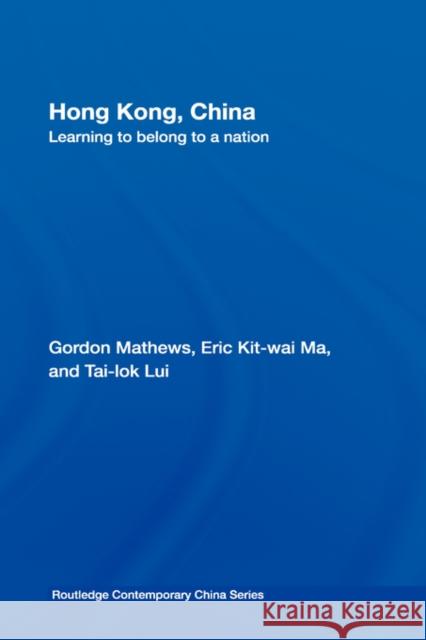Hong Kong, China: Learning to Belong to a Nation » książka
Hong Kong, China: Learning to Belong to a Nation
ISBN-13: 9780415426541 / Angielski / Twarda / 2007 / 224 str.
Hong Kong, China: Learning to Belong to a Nation
ISBN-13: 9780415426541 / Angielski / Twarda / 2007 / 224 str.
(netto: 768,08 VAT: 5%)
Najniższa cena z 30 dni: 730,42
ok. 16-18 dni roboczych.
Darmowa dostawa!
The idea of 'national identity' is an ambiguous one for Hong Kong. Returned to the national embrace of China on 1 July 1997 after 150 years as a British colony, the concept of national identity and what it means to "belong to a nation" is a matter of great tension and contestation in Hong Kong. Written by three academic specialists on Hong Kong cultural identity, social history, and mass media, this book explores the processes through which the people of Hong Kong are "learning to belong to a nation" by examining their relationship with the Chinese nation and state in the recent past, present, and future. It considers the complex meanings of and debates over national identity in Hong Kong over the past fifty years and especially during the last decade following Hong Kong's return to China. It also places these arguments within a larger, global perspective, to ask what Hong Kong can teach us about national identity and its potential transformations. Multidisciplinary in its approach, Hong Kong and China explores national identity in terms of theory, mass media, survey date, ethnography and history, and will appeal to students and scholars of Chinese history, cultural studies, and nationalism.
The idea of ‘national identity’ is an ambiguous one for Hong Kong. Returned to the national embrace of China on 1 July 1997 after 150 years as a British colony, the concept of national identity and what it means to "belong to a nation" is a matter of great tension and contestation in Hong Kong.
Written by three academic specialists on Hong Kong cultural identity, social history, and mass media, this book explores the processes through which the people of Hong Kong are "learning to belong to a nation" by examining their relationship with the Chinese nation and state in the recent past, present, and future. It considers the complex meanings of and debates over national identity in Hong Kong over the past fifty years and especially during the last decade following Hong Kong’s return to China. It also places these arguments within a larger, global perspective, to ask what Hong Kong can teach us about national identity and its potential transformations.
Multidisciplinary in its approach, Hong Kong and China explores national identity in terms of theory, mass media, survey date, ethnography and history, and will appeal to students and scholars of Chinese history, cultural studies, and nationalism.











